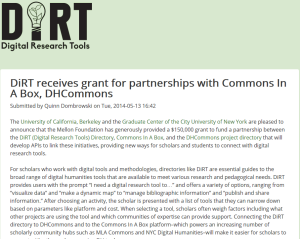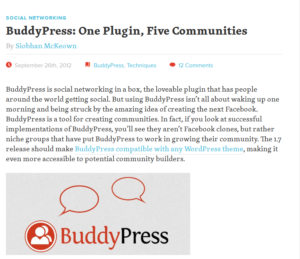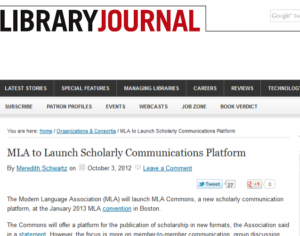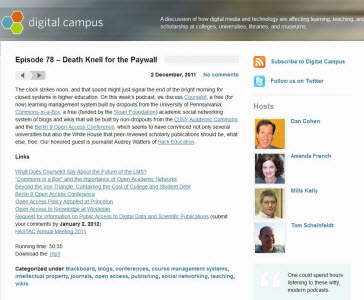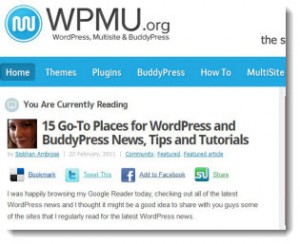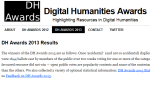|
|
|
|
|
|
 MLA to Launch Scholarly Communication Network– October, 2012— In her Library Journal article, Meredith Schwartz reports that the Modern Language Association, under the directorship of Kathleen Fitzpatrick, is building its MLA Commons based on “Commons in a Box” software.C-Box, as @kfitznotes: MLA to Launch Scholarly Communication Network– October, 2012— In her Library Journal article, Meredith Schwartz reports that the Modern Language Association, under the directorship of Kathleen Fitzpatrick, is building its MLA Commons based on “Commons in a Box” software.C-Box, as @kfitznotes:
|
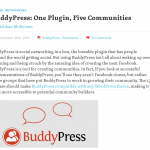 “BuddyPress: One Plugin, Five Communities” Smashing Magazine, September 26, 2012. Siobhan McKeown examines five BuddyPress implementations, including the CUNY Academic Commons: “BuddyPress: One Plugin, Five Communities” Smashing Magazine, September 26, 2012. Siobhan McKeown examines five BuddyPress implementations, including the CUNY Academic Commons:
|
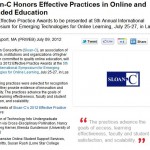 The Commons Wins a Sloan-C Award for Effective Practice– July 9, 2012 — The Sloan Consortium has announced that the CUNY Academic Commons will receive an award in effective practices in online and blended education at their 5th Annual International Symposium for Emerging Technologies for Online Learning, July 25-27, in Las Vegas.“The CUNY Academic Commons: Social Network as Hatchery” was one of six winning practices recognized for a number of criteria, including “innovation and replicability” and the ability to advance “the goals of access, learning effectiveness, faculty and student satisfaction, and scalability.” The Commons Wins a Sloan-C Award for Effective Practice– July 9, 2012 — The Sloan Consortium has announced that the CUNY Academic Commons will receive an award in effective practices in online and blended education at their 5th Annual International Symposium for Emerging Technologies for Online Learning, July 25-27, in Las Vegas.“The CUNY Academic Commons: Social Network as Hatchery” was one of six winning practices recognized for a number of criteria, including “innovation and replicability” and the ability to advance “the goals of access, learning effectiveness, faculty and student satisfaction, and scalability.” |
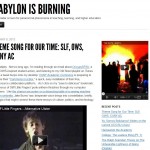 “THEME SONG FOR OUR TIME: SLF, OWS, CUNY AC” – January 8, 2012 – Larry Hanley – Babylon Is Burning – A serendipitous moment, with Stiff Little Fingers’ “Alternative Ulster” playing in the background, an email about OccupySFSU on the screen, and a popup tweet announcing “Commons in a Box,” allows Hanley’s sharp eyes to focus on alternate worlds. Coming out of The Troubles in Belfast, the 1977 the punk lyrics are angry, but resist nihilism: “Grab it, change it, it’s yours/Get an Alternative Ulster/Ignore the bores, their laws.” The Occupy movement also displays a “desperate hope” to hack together an alternate world. And the CUNY Academic Commons’ decision to view “application development as collaboration” and participate in the larger Open Source community allows for “new modes and intensities of participation. Punk imploded the distance between stage and audience, performer and fan. Open-source encourages similar erasures.” “THEME SONG FOR OUR TIME: SLF, OWS, CUNY AC” – January 8, 2012 – Larry Hanley – Babylon Is Burning – A serendipitous moment, with Stiff Little Fingers’ “Alternative Ulster” playing in the background, an email about OccupySFSU on the screen, and a popup tweet announcing “Commons in a Box,” allows Hanley’s sharp eyes to focus on alternate worlds. Coming out of The Troubles in Belfast, the 1977 the punk lyrics are angry, but resist nihilism: “Grab it, change it, it’s yours/Get an Alternative Ulster/Ignore the bores, their laws.” The Occupy movement also displays a “desperate hope” to hack together an alternate world. And the CUNY Academic Commons’ decision to view “application development as collaboration” and participate in the larger Open Source community allows for “new modes and intensities of participation. Punk imploded the distance between stage and audience, performer and fan. Open-source encourages similar erasures.”
|
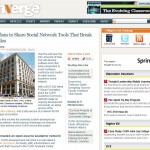 “CUNY Plans to Share Social Network Tools That Break Down Silos” – December 13, 2011 – Tanya Roscaria – Converge – Roscaria provides a detailed history of the CUNY Academic Commons and clearly articulates the need for federated “Commons” sites. The Commons In A Box provides for: “CUNY Plans to Share Social Network Tools That Break Down Silos” – December 13, 2011 – Tanya Roscaria – Converge – Roscaria provides a detailed history of the CUNY Academic Commons and clearly articulates the need for federated “Commons” sites. The Commons In A Box provides for:
|
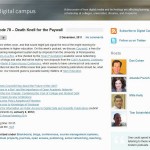 “Death Knell for the Paywall” – December 2, 2011 – In its weekly podcast, the Center for History and New Media (CHNM) at George Mason University’s Digital Campus featured “Commons in a Box” as one of three projects that are taking on corporations and developing their own educational technology. “Death Knell for the Paywall” – December 2, 2011 – In its weekly podcast, the Center for History and New Media (CHNM) at George Mason University’s Digital Campus featured “Commons in a Box” as one of three projects that are taking on corporations and developing their own educational technology.
|
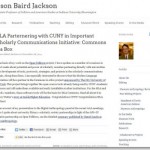 “MLA Parternering with CUNY in Important Scholarly Communications Initiative: Commons in a Box” – Nov 28, 2011- Jason Baird Jackson –Associate Professor of Folklore and American Studies at Indiana University Bloomington.Jason Baird Jackson sees the potential of partnering directly with universities in the development of tools, protocols, strategies, and projects in the scholarly communications: “MLA Parternering with CUNY in Important Scholarly Communications Initiative: Commons in a Box” – Nov 28, 2011- Jason Baird Jackson –Associate Professor of Folklore and American Studies at Indiana University Bloomington.Jason Baird Jackson sees the potential of partnering directly with universities in the development of tools, protocols, strategies, and projects in the scholarly communications:
|
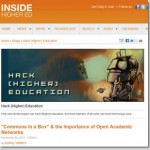 “Commons in a Box” & the Importance of Open Academic Networks” – Nov 28, 2011- Audrey Watters – Inside Higher Ed– Audrey Watters reflects on the CUNY Academic Commons’ “Commons in a Box” grant, and notes how open paradigms emphasize a community’s shared ownership of a project, and “work” for academics: “Commons in a Box” & the Importance of Open Academic Networks” – Nov 28, 2011- Audrey Watters – Inside Higher Ed– Audrey Watters reflects on the CUNY Academic Commons’ “Commons in a Box” grant, and notes how open paradigms emphasize a community’s shared ownership of a project, and “work” for academics:
|
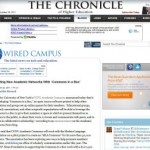 “Creating New Academic Networks With Commons in a Box” – Nov 22, 2011- Jennifer Howard – In the Chronicle of Higher Education’s Wired Campusblog, Jennifer Howard reported that the Commons has received a Sloan Foundation grant to develop an open-source software project to help other institutions set up social networks for their members. “Creating New Academic Networks With Commons in a Box” – Nov 22, 2011- Jennifer Howard – In the Chronicle of Higher Education’s Wired Campusblog, Jennifer Howard reported that the Commons has received a Sloan Foundation grant to develop an open-source software project to help other institutions set up social networks for their members.
|
 “100+ Amazing Sites Powered by WordPress and BuddyPress”- ThemeShock – June, 2011 – In their section called “Clean by Structure,” the authors praise CUNY Academic Commons for its careful organization and clean, three-column interface: “100+ Amazing Sites Powered by WordPress and BuddyPress”- ThemeShock – June, 2011 – In their section called “Clean by Structure,” the authors praise CUNY Academic Commons for its careful organization and clean, three-column interface:
|
 “Using WordPress as a Library Content Management System” – June 2011 – Kyle Jones and Polly-Alida Farrington – In the American Library Association’s Library Technology Reports, Jones & Farrington “deliver a richly illustrated, practical guide for using WordPress as a tool for managing digital content, from basic set-up to customization with plugins.” Their section “Roll your Own Social Network,” cites the CUNY Academic Commons as “Using WordPress as a Library Content Management System” – June 2011 – Kyle Jones and Polly-Alida Farrington – In the American Library Association’s Library Technology Reports, Jones & Farrington “deliver a richly illustrated, practical guide for using WordPress as a tool for managing digital content, from basic set-up to customization with plugins.” Their section “Roll your Own Social Network,” cites the CUNY Academic Commons as
|
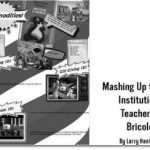 “Mashing Up the Institution: Teacher as Bricoleur” – The Radical Teacher, 2011- Larry Handley explores how technology can either reinforce centralization, standardization, and rationalization, or open up “new spaces and practices of creativity, knowledge, and communications.” He cites the Commons as an example of how networks can be hacked together for learning rather than profit: “Mashing Up the Institution: Teacher as Bricoleur” – The Radical Teacher, 2011- Larry Handley explores how technology can either reinforce centralization, standardization, and rationalization, or open up “new spaces and practices of creativity, knowledge, and communications.” He cites the Commons as an example of how networks can be hacked together for learning rather than profit:
|
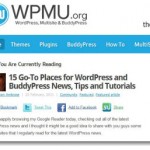 “15 Go-To Places for WordPress and BuddyPress” – WPMU.org, 2011- Siobhan Ambrose The CUNY Academic Commons was commended for its BuddyPress work: “15 Go-To Places for WordPress and BuddyPress” – WPMU.org, 2011- Siobhan Ambrose The CUNY Academic Commons was commended for its BuddyPress work:
|
 “The CUNY Academic Commons: Building the Social University” – March 2, 2011 – Kristjiana Gong – In Yale University’s Collaborative Learning Centerblog, Kristjiana Gong describes a meeting with the Commons’ own Matt Gold and Boone Gorges in which the Commons was showcased as a way to build a “social university.” “The CUNY Academic Commons: Building the Social University” – March 2, 2011 – Kristjiana Gong – In Yale University’s Collaborative Learning Centerblog, Kristjiana Gong describes a meeting with the Commons’ own Matt Gold and Boone Gorges in which the Commons was showcased as a way to build a “social university.”
|
 “The CUNY Academic Commons: fostering faculty use of the social web“ – February, 2011 – Matt Gold and George Otte – The authors published a case study in the journal On the Horizon, chronicling the steps they took to develop and implement the Commons. “The CUNY Academic Commons: fostering faculty use of the social web“ – February, 2011 – Matt Gold and George Otte – The authors published a case study in the journal On the Horizon, chronicling the steps they took to develop and implement the Commons.
|
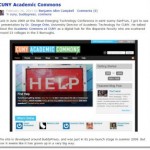 February 26, 2011 – Benjamin Allen Campbell over at The College of Education at the University of Florida gave a great shout-out to the Commons, noting how it is: February 26, 2011 – Benjamin Allen Campbell over at The College of Education at the University of Florida gave a great shout-out to the Commons, noting how it is:
|
 “The 20 Most Outstanding BuddyPress sites of 2010“– December, 2010 – In BPInspire, Jerome Degl’innocenti recently honored the CUNY Academic Commons by putting it in its list of the Top 20 BuddyPress sites! “The 20 Most Outstanding BuddyPress sites of 2010“– December, 2010 – In BPInspire, Jerome Degl’innocenti recently honored the CUNY Academic Commons by putting it in its list of the Top 20 BuddyPress sites!
|
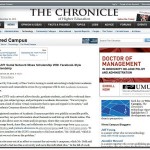 “New College Social Networks, Unlike Facebook, Foster Academic Interaction” – October 10, 2010 – Travis Kaya – In its “Technology” column, The Chronicle of Higher Education featured CUNY Academic Commons and University of Pennsylvania’s Open Learning Commons as premiere “learning communities.” “New College Social Networks, Unlike Facebook, Foster Academic Interaction” – October 10, 2010 – Travis Kaya – In its “Technology” column, The Chronicle of Higher Education featured CUNY Academic Commons and University of Pennsylvania’s Open Learning Commons as premiere “learning communities.”
|
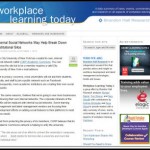 “Internal Social Networks May Help Break Down Institutional Silos” – October 1, 2010 – Richard Nantel – Brandon Hall Research’s Newletter/Blog WorkPlace Learning Today featured the CUNY Academic Commons efforts to use social networking to break down institutional silos. “Internal Social Networks May Help Break Down Institutional Silos” – October 1, 2010 – Richard Nantel – Brandon Hall Research’s Newletter/Blog WorkPlace Learning Today featured the CUNY Academic Commons efforts to use social networking to break down institutional silos.
|
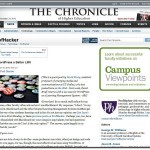 “CUNY Social Network Mixes Scholarship With Facebook-Style Friendship” – September 29, 2010 – Travis Kaya – CUNY Academic Commons was featured in “Wired Campus” column of the Chronicle for Higher Education. “CUNY Social Network Mixes Scholarship With Facebook-Style Friendship” – September 29, 2010 – Travis Kaya – CUNY Academic Commons was featured in “Wired Campus” column of the Chronicle for Higher Education.
|
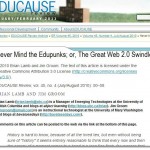 “Never Mind the Edupunks; or, The Great Web 2.0 Swindle” – July/August, 2010 – Brian Lamb and Jim Groom – In their article in Educause, the authors discuss the future of educational technology and note the accomplishments of the CUNY Academic Commons. “Never Mind the Edupunks; or, The Great Web 2.0 Swindle” – July/August, 2010 – Brian Lamb and Jim Groom – In their article in Educause, the authors discuss the future of educational technology and note the accomplishments of the CUNY Academic Commons.
|
 “WordPress a Better LMS” – March 18, 2010 – David Parry – CUNY Academic Commons was one of three examples listed in The Chronicle of Higher Education’s “Prof Hacker” column about how to use WordPress as a LMS tool. “WordPress a Better LMS” – March 18, 2010 – David Parry – CUNY Academic Commons was one of three examples listed in The Chronicle of Higher Education’s “Prof Hacker” column about how to use WordPress as a LMS tool.
|
-
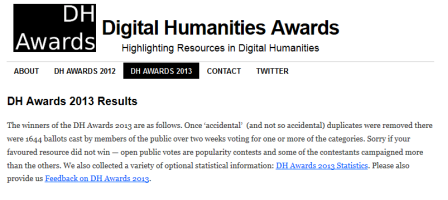 “Commons in a Box wins 2013 Award for Best Digital Humanities Tool or Suite of Tools“
“Commons in a Box wins 2013 Award for Best Digital Humanities Tool or Suite of Tools“Digital Humanities Awards – Highlighting Resources in Digital Humanities, 2013
We are proud to announce that Commons in a Box received the “Best Digital Humanities Tool or Suite of Tools” award from Digital Humanities Awards – Highlighting Resources in Digital Humanities.
-
DiRT receives grant for partnerships with Commons In A Box, DHCommons
DiRT – Digital Research Tools – May, 2014
“The University of California, Berkeley and the Graduate Center of the City University of New York are pleased to announce that the Mellon Foundation has generously provided a $150,000 grant to fund a partnership between the DiRT (Digital Research Tools) Directory, Commons In A Box, and the DHCommons project directory that will develop APIs to link these initiatives, providing new ways for scholars and students to connect with digital research tools.”
-
“BuddyPress: One Plugin, Five Communities”
Smashing Magazine, September 26, 2012
Siobhan McKeown examines five BuddyPress implementations, including the CUNY Academic Commons:
“The Commons is in the lucky position of having a lead developer who is one of the core committers to BuddyPress. … As BuddyPress’ core becomes more stable and lean, the team at CUNY will be able to build even more custom plugins and functionality, which can be used in the Commons and disseminated to the wider community.”
-
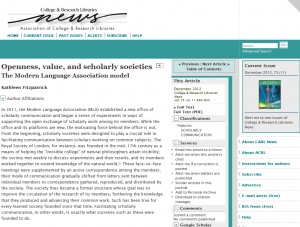 “Openness, value, and scholarly societies: The Modern Language Association model”
“Openness, value, and scholarly societies: The Modern Language Association model” College and Research Libraries, December, 2012
Kathleen Fitzpatrick lays out the MLA’s plans to ensure public access to the group’s published works, and includes a nice mention of the CUNY Academic Commons and the collaborative effort to build networked communities designed to help members connect, collaborate, and share.
“We understand MLA Commons as one key to the new value proposition for scholarly societies, in which members join the association less in order to receive its communications than to participate in them, to be part of the conversation, and to have their work circulated with the work being done in their community of practice.”
-
“MLA to Launch Scholarly Communications Platform”
Library Journal, October, 2012
In her LJ article, Meredith Schwartz reports that the Modern Language Association, under the directorship of Kathleen Fitzpatrick, is building its MLA Commons based on “Commons in a Box” software. C-Box, as @kfitz notes:
“… is working toward a federated commons-of-commonses … developing greater connections across scholarly societies as well as with universities and other higher education organizations.”
-
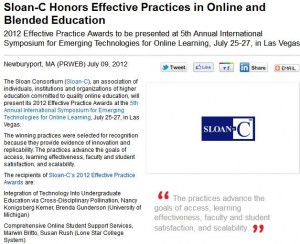 The Commons Wins a Sloan-C Award for Effective Practice – July 9, 2012
The Commons Wins a Sloan-C Award for Effective Practice – July 9, 2012The Sloan Consortium has announced that the CUNY Academic Commons will receive an award in effective practices in online and blended education at their 5th Annual International Symposium for Emerging Technologies for Online Learning, July 25-27, in Las Vegas.
“The CUNY Academic Commons: Social Network as Hatchery” was one of six winning practices recognized for a number of criteria, including “innovation and replicability” and the ability to advance “the goals of access, learning effectiveness, faculty and student satisfaction, and scalability.”
-
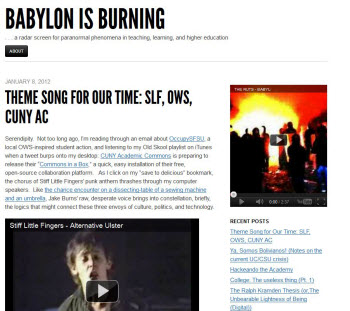 “THEME SONG FOR OUR TIME: SLF, OWS, CUNY AC” – January 8, 2012 – Larry Hanley – Babylon Is Burning – A serendipitous moment, with Stiff Little Fingers’ “Alternative Ulster” playing in the background, an email about OccupySFSU on the screen, and a popup tweet announcing “Commons in a Box,” allows Hanley’s sharp eyes to focus on alternate worlds. Coming out of The Troubles in Belfast, the 1977 punk lyrics are angry, but resist nihilism: “Grab it, change it, it’s yours/Get an Alternative Ulster/Ignore the bores, their laws.” The Occupy movement also displays a “desperate hope” to hack together an alternate world. And the CUNY Academic Commons’ decision to view “application development as collaboration” and participate in the larger Open Source community allows for
“THEME SONG FOR OUR TIME: SLF, OWS, CUNY AC” – January 8, 2012 – Larry Hanley – Babylon Is Burning – A serendipitous moment, with Stiff Little Fingers’ “Alternative Ulster” playing in the background, an email about OccupySFSU on the screen, and a popup tweet announcing “Commons in a Box,” allows Hanley’s sharp eyes to focus on alternate worlds. Coming out of The Troubles in Belfast, the 1977 punk lyrics are angry, but resist nihilism: “Grab it, change it, it’s yours/Get an Alternative Ulster/Ignore the bores, their laws.” The Occupy movement also displays a “desperate hope” to hack together an alternate world. And the CUNY Academic Commons’ decision to view “application development as collaboration” and participate in the larger Open Source community allows for
“…new modes and intensities of participation. Punk imploded the distance between stage and audience, performer and fan. Open-source encourages similar erasures.” -
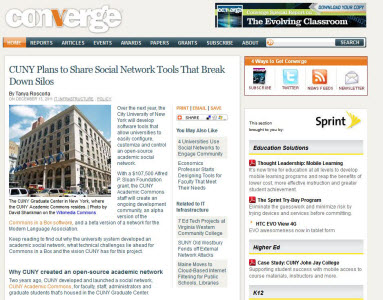 “CUNY Plans to Share Social Network Tools That Break Down Silos”
“CUNY Plans to Share Social Network Tools That Break Down Silos”December 13, 2011 – Tanya Roscaria – Converge
Roscaria provides a detailed history of the CUNY Academic Commons and clearly articulates the need for federated “Commons” sites. The Commons In A Box provides for:
…a constellation of collaborative common spaces that will help scholars, academics and people working at nonprofits do their work. If someone’s a member of two different commons like CUNY and MLA, that person should be able to have their information in both spaces without typing it twice…
-
December 2, 2011
In its weekly podcast, the Center for History and New Media (CHNM) at George Mason University’s Digital Campus featured “Commons in a Box” as one of three projects that are taking on corporations and developing their own educational technology.
…a free (funded by the Sloan Foundation) academic social networking system of blogs and wikis that will be built by non-dropouts from the CUNY Academic Commons…
-

“MLA Parternering with CUNY in Important Scholarly Communications Initiative: Commons in a Box”Nov 28, 2011 – Jason Baird Jackson – Associate Professor of Folklore and American Studies at Indiana University Bloomington.
Jason Baird Jackson sees the potential of partnering directly with universities in the development of tools, protocols, strategies, and projects in the scholarly communications:
This project brings together the open source tools already being used by CUNY Academic Commons and will make them available and easily installable at other institutions. For the MLA and its 30K+ members, these software tools will be the basis for MLA Commons.
-
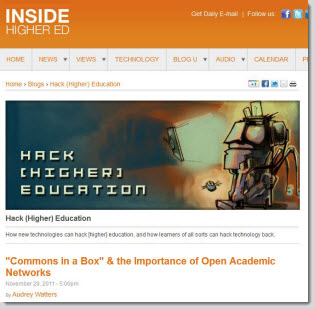 “Commons in a Box & the Importance of Open Academic Networks“
“Commons in a Box & the Importance of Open Academic Networks“Nov 28, 2011- Audrey Watters – Inside Higher Ed.
Audrey Watters reflects on the CUNY Academic Commons’ “Commons in a Box” grant, and notes how open paradigms emphasize a community’s shared ownership of a project, and “work” for academics…
…open source versus proprietary technology isn’t the only thing at stake. Nor is it simply that Commons in a Box supports an open ecosystem versus a “walled garden.” It is that latter piece that seems particularly noteworthy, however, as the project is part of a larger movement on campuses to open up academic scholarship itself — not just through (open source) social networking but through open access…
-
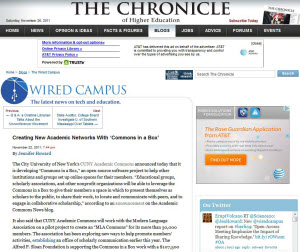 “Creating New Academic Networks With ‘Commons in a Box‘”
“Creating New Academic Networks With ‘Commons in a Box‘”Jennifer Howard – November 22, 2011
In the Chronicle of Higher Education’s Wired Campus blog, Jennifer Howard reported that the Commons has received a Sloan Foundation grant to develop an open-source software project to help other institutions set up social networks for their members.
…CUNY Academic Commons will work with the Modern Language Association on a pilot project to create an “MLA Commons” for its more than 30,000 members … to help promote members’ activities…
-
“100+ Amazing sites Powered by WordPress and BuddyPress”
ThemeShock, 2011
In their section called “Clean by Structure,” the authors praise CUNY Academic Commons for its careful organization and clean, three-column interface that is
“…designed to support faculty initiatives and build community through the use of technology in teaching and learning…”
-
“Using WordPress as a Library Content Management System“
June 2011 – Kyle Jones and Polly-Alida Farrington
In the American Library Association’s Library Technology Reports, Jones & Farrington “deliver a richly illustrated, practical guide for using WordPress as a tool for managing digital content, from basic set-up to customization with plugins.” Their section “Roll your Own Social Network,” cites the CUNY Academic Commons as
one of the most successful BuddyPress projects in education.
-
Benjamin Allen Campbell over at The College of Education at the University of Florida gave a great shout-out to the Commons, noting how it is:
“…a digital hub for the disparate faculty who are scattered around 23 colleges in the 5 Burroughs” and how it “has grown up in a very big way.”
-
“15 Go-To Places for WordPress and BuddyPress”
WPMU.org, 2011- Siobhan Ambrose
The CUNY Academic Commons was commended for its BuddyPress work:
“As well as releasing a number of significant BuddyPress plugins, they also post regularly with BuddyPress Tips and Hacks. As a large BuddyPress network they produce some insightful and useful content that you should be taking advantage of.”
-
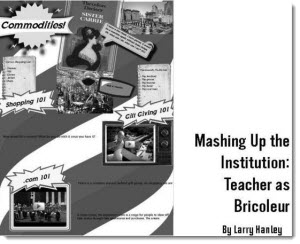 Mashing up the Institution: Teacher as Bricoleur
Mashing up the Institution: Teacher as BricoleurThe Radical Teacher, 2011 – Larry Hanley
Handley explores how technology can either reinforce centralization, standardization, and rationalization, or open up “new spaces and practices of creativity, knowledge, and communications.” He cites the Commons as an example of how networks can be hacked together for learning rather than profit:
“…the faculty at City University of New York have recently used WordPress, an open-source blog engine, to create the CUNY Academic Commons, a virtual platform for scholarly exchange and teacher collaboration shaped by interests and engagement of faculty.”
-
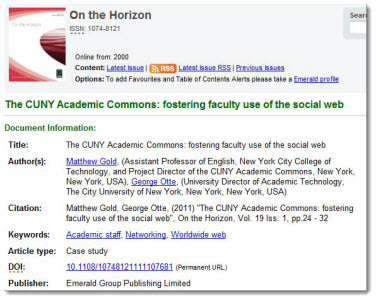 The CUNY Academic Commons: Fostering Faculty Use of the Social Web
The CUNY Academic Commons: Fostering Faculty Use of the Social Web2011 – Matthew Gold and George Otte
The authors published a case study in the journal On the Horizon, chronicling the steps they took to develop and implement the Commons.
“… open and participatory forms of academic social spaces within the CUNY system encourage peer-to-peer learning among faculty members and experimentation with social media in the classroom. As a generative platform for engaging social media, the CUNY Academic Commons is making the professoriate of the largest urban public university
system in the world more visible to itself and to a wider public.”
